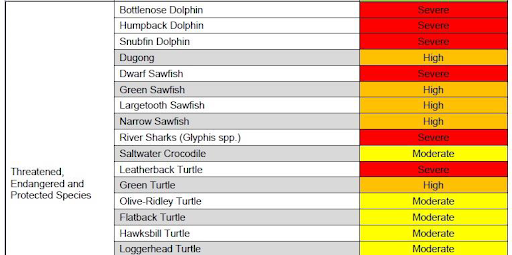MEDIA RELEASE 1 February 2023
Conservation groups have welcomed the Northern Territory Government’s decision to withdraw its application for accreditation as a Wildlife Trade Operation (WTO), which would enable the export of seafood from the Territory’s barramundi fishery.
An export licence would have incentivised greater fishing activity, placing increased pressure on endangered wildlife such as leatherback turtles, sawfish and vulnerable snubfin dolphins, whose populations are already at severe risk from the fishery.
The NT’s barramundi fishery is a gillnet fishery that the NT Government’s Fisheries Division in 2021 assessed as posing “high” to “severe” risks to a myriad of threatened, endangered and protected species.1 Despite its own department’s assessment and no mitigation measures to protect these species, the NT Government prematurely applied for accreditation as a Wildlife Trade Operation (WTO) to enable the export of seafood from the fishery.
Keep Top End Coasts Healthy (KTECH), Australian Marine Conservation Society (AMCS) and Humane Society International (HSI) said the NT Government’s decision to withdraw the application indicated it better understands the serious problems that need to be addressed in its barramundi fishery.
Adele Pedder, spokesperson for Keep Top End Coasts Healthy, said: “The Northern Territory Government must not rush the barra fishery’s reform and take the time required to ensure the environmental issues are resolved because Territorians depend on healthy Top End coasts for work, play and culture. No one wants to see dead sawfish, turtles or dugongs in commercial gillnets.”
HSI marine biologist Lawrence Chlebeck said: “The Northern Territory is one of the last remaining strongholds for Critically Endangered sawfish in the world. NT fisheries minister Paul Kirby must do everything he can secure these fragile populations. The global spotlight is on the NT Government to show leadership to protect one of the world’s most endangered groups of sharks and rays, and their home – one of the world’s last relatively intact tropical coastlines.”
Despite improvements in fishers accurately reporting interactions with threatened species in the past two years, inadequate levels of independent observer coverage are significantly limiting the ability to accurately determine the magnitude of impact, with underreporting acknowledged as a significant and ongoing issue.
Since the NT Government applied for a WTO in October 2021, positive progress has been made towards reforming the fishery through a collaborative working group process that includes scientists, Traditional Owner representatives, conservationists and the fishing industry. The group has identified and tabled specific solutions to reduce bycatch of threatened species and support the recovery of endangered animals, but no solutions have yet been formally implemented in the fishery’s new management arrangements.
AMCS Fisheries and Threatened Species Campaign Manager Alexia Wellbelove said: “We strongly encourage NT Fisheries Minister Paul Kirby to take the time necessary to implement recommendations from the federal government2 and the solutions being developed by the barra fishery’s bycatch working group that support the recovery of threatened species and future sustainability of the fishery.”
Editors notes:
NT Government’s Fisheries Division’s assessment of the NT barramundi fishery, 2021
-
The NT barra fishery has had “sparse [observer] coverage since 2017” and inconsistencies in logbook reports since 2016 suggest considerable levels of underreporting of interactions.
-
Excerpt below from the environmental risk assessment of threatened, endangered and protected species interacting with the NT Barramundi Fishery lists species at “severe” and “high” risk. See original table in “Application for a Wildlife Trade Operation (WTO): Barramundi (Lates calcarifer) and associated by-product species, Northern Territory Barramundi Fishery”
1 https://www.dcceew.gov.au/sites/default/files/documents/nt-barramundi-wto-application-supporting-documentation.pdf
2 The recommendations made by the federal government to minimise bycatch and improve the sustainability of the barramundi fishery can be found here, as can the NT Government’s response to the federal government’s advice to withdraw.
